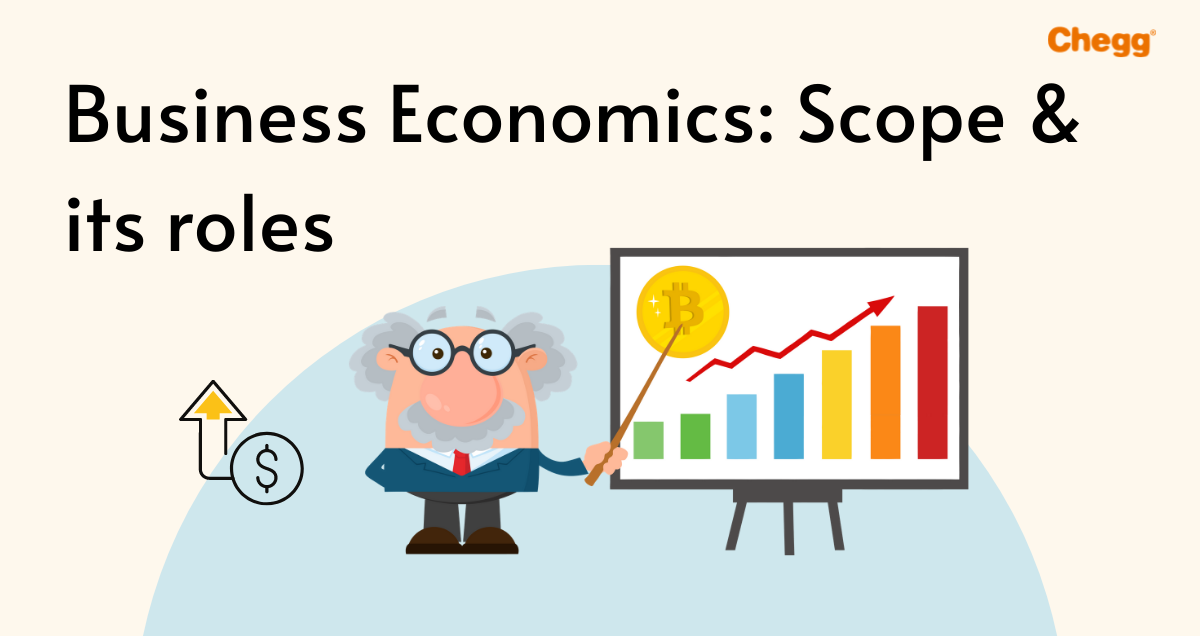Business Economics and Its Roles in Your Career
Business Economics is a subject in which one studies the application of economic theory to business management. It is also called managerial economics. However, the definition of managerial economics is slightly different. The subject includes many other disciplines.

Introduction
Business Economics is a subject in which one studies the application of economic theory to business management. It is also called managerial economics. However, the definition of managerial economics is slightly different. The subject includes many other disciplines. Anyone who studies Business Economics would learn concepts like accounting, finance, statistics, and many others. The subject helps us to understand how economic theories can be used while making decisions in order to grow our business. Business Economics opens up many options for the graduate and post-graduate. The scope of business economics is vast!
The article talks about Business Economics, its scope, and career options one can have after studying the subject. It also explains job roles and other opportunities one can have. It does explain the concept of managerial economics as well. Definition of managerial economics explains the details of how business economics is the combined concept of other concepts.
What is Business Economics?
Business economics is a combination of two major concepts: Economic theory and Business practices. The subject helps in making the decisions in a business.
Economic theory: It deals with some techniques such as cost, demand-supply, and consumption for the analysis of any business situation. Besides, it does provide information on production and demands.
It consists of various techniques such as demand and supply, cost, and consumption to analyze all aspects of a business situation. Also, it provides us with past and present information regarding the growth in production and demands. Economic theory tells us the quality and quantity of resources used in a business. For instance, how human and non-human resources have improved with time and the growth pattern. However, it does not clarify why there is a non-smooth growth pattern. That’s why Business practices are needed.
Economic theory and business practice come together to help understand the concept of Business Economics.
Managerial economics is an important offshoot of Business Economics.
Definition of Managerial Economics
Managerial economics deals with the study of how to solve business problems and how to make decisions in a business with the application of theory and principle of microeconomics and macroeconomics. Managerial economics helps us to deal with the internal issues of the organizations by using various economic theories.
It is a multidisciplinary subject. The subject uses many other tools and combines many other disciplines such as human resources, marketing, statistics, finance, accounting, etc.
How to study Business Economics?
To study this subject, one can choose Bachelors’ in Business Economics. In India, very few colleges offer this program. It is a full-time three-year program. The admission process and tuition fees vary from college to college. Here are some of the colleges which do offer bachelors in Business Economics:
- Lady Irwin College, Delhi University
- Delhi School of Economics, Delhi University
- Christ University, Bangalore
- Loyola College, Chennai
- Gargi College, Delhi University
- Miranda House, Delhi University
- Presidency University, Kolkata
There many other colleges of Delhi University to which one can apply. Just visit the website of Delhi University. To learn more and get more information.
Bachelors
Anyone who would want to study Business Economics or marginal economics can take admission to any of these colleges. The admission is entrance-based. Prepare for the entrance as per the syllabus. The syllabus can be downloaded from the websites of the colleges.
The subjects one would study during graduation are Business Analysis, Business Statistics, Microeconomics, Business Environment, Macroeconomics, Financial Accounting, and International Business.
The under-graduate program in which you would study Business Economics are:
- BBA in Business Economics
- BA (Hons) in Business Economics
- B. Com in Business Economics
- BA (Hons) in Business and Economics
- B. Com (Hons) in Business Economics
Higher education
After completing graduation, one can go for a masters. Master’s in business economics is indeed an option. However, a very popular master’s program is MBA.
A master’s level you can choose among:
- MBA in Business Economics
- MA in Business Economics
- Integrated Post Graduate Diploma in Business Economics
- MA in Applied Economics
Before opting for any of the courses, it is advisable to have a look at the course curriculum. Similarly, read the FAQs (Frequently asked questions) before applying to the program. You will be able to understand the admission process and other details.
Business Economics – scope and roles
Teaching
You can become a teacher of Business Economics. One can even choose one particular subject which he/she learned during the bachelors or masters. Teaching is indeed a noble profession. In this profession, you do empower someone. One has to keep herself/himself updated. Therefore, the teacher is supposed to read new research. These days, teaching has become online. After COVID-19 spread, Online lectures have become part of the teaching. To sum up, one can earn while learning just sitting at home and stay safe!
All you need to do is to prepare presentations for the topics you are given. Then, take an online lecture of the students allotted to you by the university or college in which you get the job by applying on the notifications.
MBA
MBA is a master’s in Business Management which is a two-year program. Many government and private colleges do offer an MBA. However, most of the colleges have entrance-based admission criteria. if is a professional course, therefore it is opted by many. There is a command entrance exam in India to get into MBA. CAT (common admission test) held every year during the month of November. In India, the top colleges for MBA are IIMs (Indian Institute of Management). One of the IIMs conducts the CAT exam. After getting a good percentile, one has to clear the interview conducted by the various MBA colleges. There are many other colleges such as TAPMI, FMS, and others. These colleges do accept CAT scores, however, some of the colleges have an additional criterion of clearing their respective entrance too.
Government jobs
If you are hard-working and can study for hours, then prepare for government exams. Many state and central government exams are there which one can take and clear to get a permanent job. Moreover, these exams are not that easy to crack. The competition is really tough as everybody wants to get a permanent job. In India, government jobs are always students’ priority.
Corporate jobs
After completing your graduation, you can apply for jobs in any private company or even start-up. It does happen that people get jobs through their contacts. So, it is important to make connections during your studies. You can find a job through job portals. There are many job portals such as Naukri.com, timesjob.com, monster world, shine.com, indeed.com, and many more.
Here are some of the profiles in which one can apply as per eligibility criteria and their interest:
- Researcher
- Chief Economist
- Finance advisor
- Public accountant
- Analyst
- Business development manager
- Sales and marketing consultant
There are many more job profiles and one can apply for a specific role on the job portal.
How to apply for a job after business economics?
Firstly, get yourself registered on job portals. It is free! Secondly, Make an account. Thirdly, Fill in all the basic details about yourself including your educational background, skills, and internships. Upload your CV. It is advisable to make your CV stand out with all your professional details. Keep your profile updated!
Banking job
To get a job in a bank, one has to clear banking exams. There are many private and public sector banks. Therefore, the criteria to get a job are more or less different from them. The most common baking positions for which you can apply are SBI PO, IBPS PO, RBI grade B officer. In addition, there are some more jobs such as NABARD and SBI clerk, IBPS Clerk, etc. You can apply for any of these jobs. However, one has to choose one and pre[are for that exam. All of these exams come under the same category. However, the syllabus of each of these exams is different. Therefore, one has to prepare accordingly.
The exams usually have three-stages to be cleared by the candidate:
- Preliminary test
- Mains
- Interview
Majorly there are 4 sections in the exam and the syllabus of these exams can be downloaded from the websites of the banks.
- Reasoning Ability
- Quantitative Aptitude
- English Language
- General Awareness
Subject Matter Expert (SME)
Once you master Business economics you can become a subject matter expert. Chegg gives an opportunity to all the people who are good at one subject at least. The subject matter expert is expected to have enough knowledge to answer the questions related to the subject. These days, being a subject matter expert is indeed a very good option as one can earn just by sitting at home. All you need is to have knowledge of one particular subject, a stable internet connection, and a laptop. You can work at your convenience.
Chegg hires a subject matter expert (SME) as a freelancer. Even on a full-time or contractual basis. To become a subject matter expert, one has to register on the website of Chegg India. Every time sign up and answer the question related to Business Economics or any subject which you have studied during the program. Subject matter experts earn really well. They earn around 30k-70k per month. However, your quality of answers does matter a lot.
Entrepreneurship
If you have an idea and you know how to execute it, then be an entrepreneur! you will be your won boss. Your hard work and consistency will lead to a successful founder. Before becoming an entrepreneur, it is important to do a bit research about the market, the demand, and the need of the people. Formulate a plan on how would you execute it.
You might need a business partner or an investor. Any friend of yours may become your investor. However, it is important how you articulate your idea so that the investor or your to be business partner show interest in it.
The scope of business economics can be understood by the various jobs and career options mentioned above. The roles demand expertise in the respective role. However, freshers can learn during their first job. Consistent work in the job is required to have experience. Learn as much as you can after your first job. Eventually, you will get expertise. Once you acquire enough skills, your earning will definitely increase.
The post Business Economics and Its Roles appeared first on Chegg India.


















/cdn.vox-cdn.com/uploads/chorus_asset/file/25115065/DCD_Avishai_Abrahami.jpg)







